Indian Island off the coast of Northern California was the site of a massacre, a place that was contaminated by a shipyard and flush with invasive species.
It's also the spiritual and physical center of the universe for the small Wiyot Tribe, and it now belongs to them almost entirely after a city deeded all the land it owns on the island to the tribe during a packed signing ceremony Monday.
"It's a really good example of resilience because Wiyot people never gave up the dream," tribal administrator Michelle Vassel said. "It's a really good story about healing and about coming together of community."
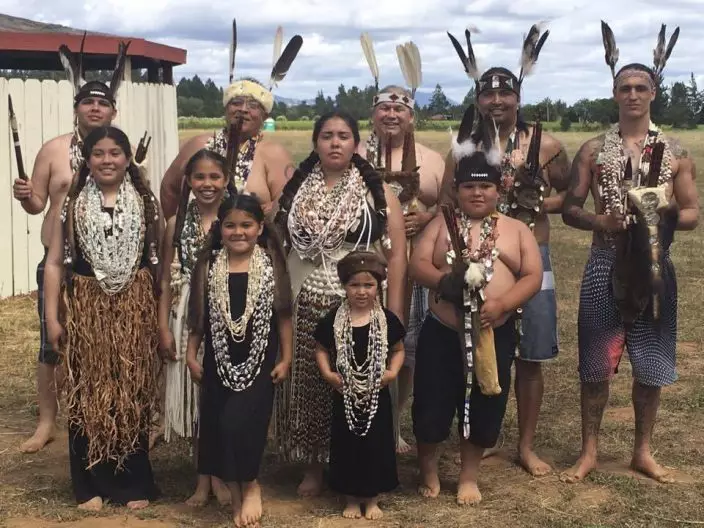
This undated photo provided by the Wiyot Tribe shows a group of tribal brush dancers. On Monday, Oct. 21, 2019, the city of Eureka will sign over the deed to the largest chunk, more than 200 acres in what was the historic village of Etpidolh. No money was exchanged. (Wiyot Tribe via AP)
The tribe was decimated in 1860, when scores of elders, women and children were wiped out during a raid by settlers while the tribe's men were away gathering supplies. Since then, the now 600-member tribe has been making small strides toward regaining the land it lost.
The tribe sold art and fry bread and took in donations to buy 1.5 acres (0.6 hectares) on the eastern tip of the island for $106,000 in 2000. Years later, the city of Eureka gave the tribe more land.
During the signing celebrated with a prayer, a traditional Native American dance and cheers from a crowd, city officials turned over over the deed to the largest chunk of land — more than 200 acres (81 hectares) in what was once the historic village of Etpidolh. No money was exchanged.
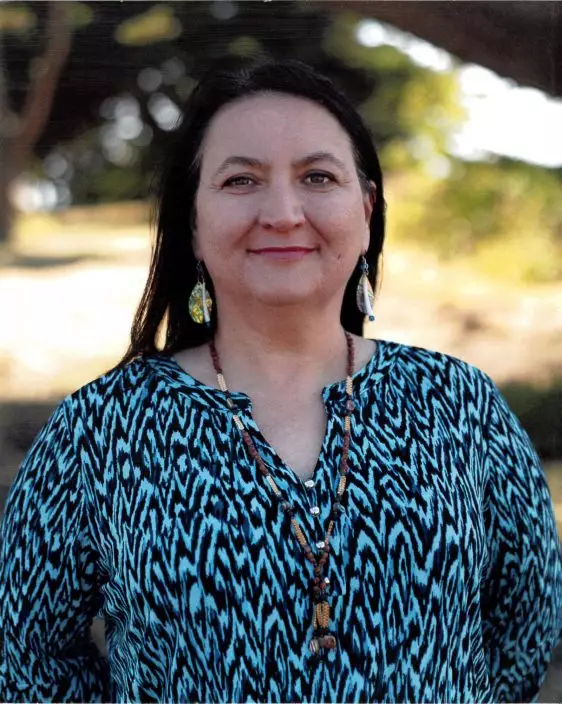
This undated photo provided by the Wiyot Tribe shows Wiyot tribal administrator Michelle Vassel. On Monday, Oct. 21, 2019, the city of Eureka will sign over the deed to the largest chunk, more than 200 acres in what was the historic village of Etpidolh. No money was exchanged. (Wiyot Tribe via AP)
"For our city, it's the right thing to do, and that's why we're doing it," said Councilwoman Kim Bergel, who was born and raised in the county. "Certainly, it's been far too long."
Tribes have lost millions of acres of land through treaties broken by the U.S. government, by force and in exchange for federal services such as health care and education. Rarely has it been restored, said Cris Stainbrook, president of the Indian Land Tenure Foundation. Most tribes resort to buying land as it comes up for sale.
The tribe with the largest land base of any, Navajo Nation in the Southwest, has purchased ranches in Colorado outside the boundary of its 27,000 square-mile (70,000 square-kilometer) reservation.
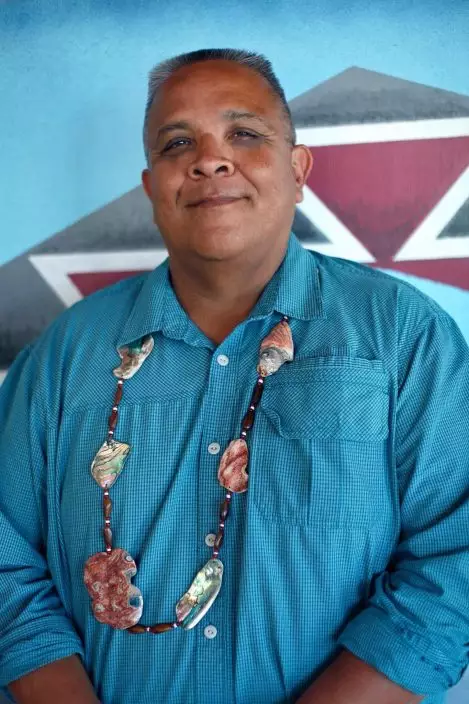
This undated photo provided by the Wiyot Tribe shows Wiyot tribal Chairman Ted Hernandez. On Monday, Oct. 21, 2019, the city of Eureka will sign over the deed to the largest chunk, more than 200 acres in what was the historic village of Etpidolh. No money was exchanged. (Wiyot Tribe via AP)
In New Mexico, Santa Ana Pueblo bought back a large swath of ancestral land in 2016 for an undisclosed price. Isleta Pueblo to the south added 140 square miles (362 square kilometers) to its reservation the same year when federal officials agreed to put it into trust.
The U.S. government offered Sioux tribes money for seizing the Black Hills more than a century ago. The tribes refused the payment and have sought return of the land.
In California, a former Wiyot councilman unsuccessfully petitioned Eureka for part of Indian Island in the 1970s. The tribe started fundraising in 1998, watching for any properties that came up for sale.
The Wiyot knew the parcel it bought in 2000 had extensive contamination from a former shipyard that was established on the island shortly after the massacre, along with livestock grazing. That didn't matter. People in the community asked what they could do to help.
The tribe and community members came together to remove boat batteries, lead paint, chemicals, scrap metal, rusty buckets, a huge engine and contaminated soil. A 1,000-year-old clamshell mound containing burial sites, tools and things left over from ceremonies was restored.
The land was deemed safe in 2014. The overall quality of water, plants and marine life have improved, the tribe says.
Vassel took the first group of children there and remembers the excitement.
"You could feel it in the air," she said. "The feeling of coming home."
The clean bill of health by the U.S. Environmental Protection Agency also meant the tribe could resume a ceremony it was forced to abandon after the massacre.
The ceremony staged in 2014 to renew the world and restore balance lasted 10 days. Sea lions came up on the beach and watched dancers and singers. Egrets stooped on cypress trees.
The last day started off clear and sunny, before heavy rain sent 100 people fleeing for shelter, which Tribal Chairman Ted Hernandez took as a sign the ceremony was complete.
"We knew our ancestors were still there," Hernandez said. "We can feel them, saying 'we are watching you, we know that what you are doing is correct.' It's a peaceful feeling."
The tribe has been trying to revive its language and cultural practices that were driven underground after the massacre. The last person fluent in the Wiyot language died in the 1960s. Some elders who were sent to boarding school were afraid to teach Wiyot traditions to the younger generation, Hernandez said.
The massacre is a point of history third-graders learn during a ferry tour that passes Indian Island, Bergel said. Over the years, tribal members and the community have joined in a candlelight vigil around the anniversary to remember those lost.
The tribe's reservation in Loleta is southwest of Indian Island, which can take hours to reach by boat. During the highest tide, the island can become submerged.
The city had no use for the land it declared surplus property and offered up to public agencies but had no takers. Few parcels on the island are privately owned.
The tribe imagines the island as a place where native plants can flourish and be used in ceremonies, where the community can gather and where its renewal ceremony can be practiced annually. The next one is scheduled in March.
Officials attribute the relationship built between Eureka and the Wiyot to communication and understanding that they all benefit from the health of the island.
"It was never vile, us versus them," Vassel said. "It was more about healing the community, healing the land. We all live in this community together."
Associated Press writer Susan Montoya Bryan in Albuquerque, New Mexico, contributed to this story.
UNITED NATIONS (AP) — The United States vetoed a widely backed U.N. resolution Thursday that would have paved the way for full United Nations membership for Palestine, a goal the Palestinians have long sought and Israel has worked to prevent.
The vote in the 15-member Security Council was 12 in favor, the United States opposed and two abstentions, from the United Kingdom and Switzerland. U.S. allies France, Japan and South Korea supported the resolution.
The strong support the Palestinians received reflects not only the growing number of countries recognizing their statehood but almost certainly the global support for Palestinians facing a humanitarian crisis caused by the war in Gaza, now in its seventh month.
The resolution would have recommended that the 193-member U.N. General Assembly, where there are no vetoes, approve Palestine becoming the 194th member of the United Nations. Some 140 countries have already recognized Palestine, so its admission would have been approved, likely by a much higher number of countries.
U.S. deputy ambassador Robert Wood told the Security Council that the veto “does not reflect opposition to Palestinian statehood but instead is an acknowledgment that it will only come from direct negotiations between the parties."
The United States has “been very clear consistently that premature actions in New York — even with the best intentions — will not achieve statehood for the Palestinian people,” deputy State Department spokesman Vedant Patel said.
His voice breaking at times, Palestinian U.N. Ambassador Riyad Mansour told the council after the vote: “The fact that this resolution did not pass will not break our will and it will not defeat our determination.”
“We will not stop in our effort,” he said. “The state of Palestine is inevitable. It is real. Perhaps they see it as far away, but we see it as near.”
This is the second Palestinian attempt for full membership and comes as the war in Gaza has put the more than 75-year-old Israeli-Palestinian conflict at center stage.
Palestinian President Mahmoud Abbas first delivered the Palestinian Authority’s application for U.N. membership in 2011. It failed because the Palestinians didn’t get the required minimum support of nine of the Security Council’s 15 members.
They went to the General Assembly and succeeded by more than a two-thirds majority in having their status raised from a U.N. observer to a non-member observer state in 2012. That opened the door for the Palestinian territories to join U.N. and other international organizations, including the International Criminal Court.
Algerian U.N. Ambassador Amar Bendjama, the Arab representative on the council who introduced the resolution, called Palestine’s admission “a critical step toward rectifying a longstanding injustice" and said that “peace will come from Palestine’s inclusion, not from its exclusion.”
In explaining the U.S. veto, Wood said there are “unresolved questions” on whether Palestine meets the criteria to be considered a state. He pointed to Hamas still exerting power and influence in the Gaza Strip, which is a key part of the state envisioned by the Palestinians.
Wood stressed that the U.S. commitment to a two-state solution, where Israel and Palestine live side-by-side in peace, is the only path for security for both sides and for Israel to establish relations with all its Arab neighbors, including Saudi Arabia.
“The United States is committed to intensifying its engagement with the Palestinians and the rest of the region, not only to address the current crisis in Gaza, but to advance a political settlement that will create a path to Palestinian statehood and membership in the United Nations,” he said.
Mansour, the Palestinian U.N. ambassador, reiterated the commitment to a two-state solution but asserted that Israel believes Palestine "is a permanent strategic threat."
"Israel will do its best to block the sovereignty of a Palestinian state and to make sure that the Palestinian people are exiled away from their homeland or remain under its occupation forever,” he said.
He demanded of the council and diplomats crowded in the chamber: “What will the international community do? What will you do?”
Israeli-Palestinian negotiations have been stalled for years, and Israel’s right-wing government is dominated by hard-liners who oppose Palestinian statehood.
Israeli U.N. Ambassador Gilad Erdan called the resolution “disconnected to the reality on the ground” and warned that it “will cause only destruction for years to come and harm any chance for future dialogue.”
Six months after the Oct. 7 attack by the Hamas militant group, which controlled Gaza, and the killing of 1,200 people in “the most brutal massacre of Jews since the Holocaust,” he accused the Security Council of seeking “to reward the perpetrators of these atrocities with statehood.”
Israel’s military offensive in response has killed over 32,000 Palestinians, according to Gaza’s health ministry, and destroyed much of the territory, which speaker after speaker denounced Thursday.
After the vote, Erdan thanked the United States and particularly President Joe Biden “for standing up for truth and morality in the face of hypocrisy and politics.”
He called the Palestinian Authority — which controls the West Bank and the U.S. wants to see take over Gaza where Hamas still has sway — “a terror supporting entity.”
The Israeli U.N. ambassador referred to the requirements for U.N. membership – accepting the obligations in the U.N. Charter and being a “peace-loving” state.
“How can you say seriously that the Palestinians are peace loving? How?” Erdan asked. “The Palestinians are paying terrorists, paying them to slaughter us. None of their leaders condemns terrorism, nor the Oct. 7 massacre. They call Hamas their brothers.”
Despite the Palestinian failure to meet the criteria for U.N. membership, Erdan said most council members supported it.
“It’s very sad because your vote will only embolden Palestinian rejectionism every more and make peace almost impossible,” he said.
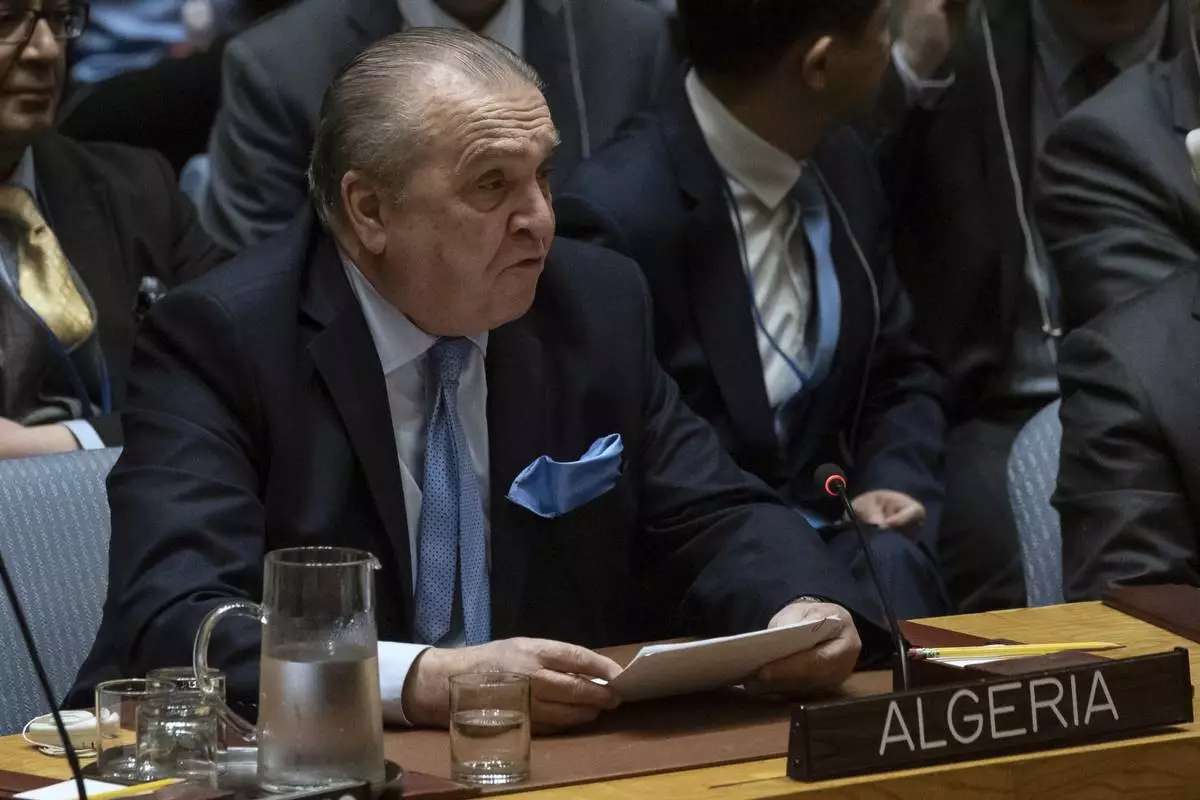
Algeria's Permanent Ambassador to the United Nations Amar Bendjama speaks during a Security Council meeting at United Nations headquarters, Thursday, April 18, 2024. (AP Photo/Yuki Iwamura)
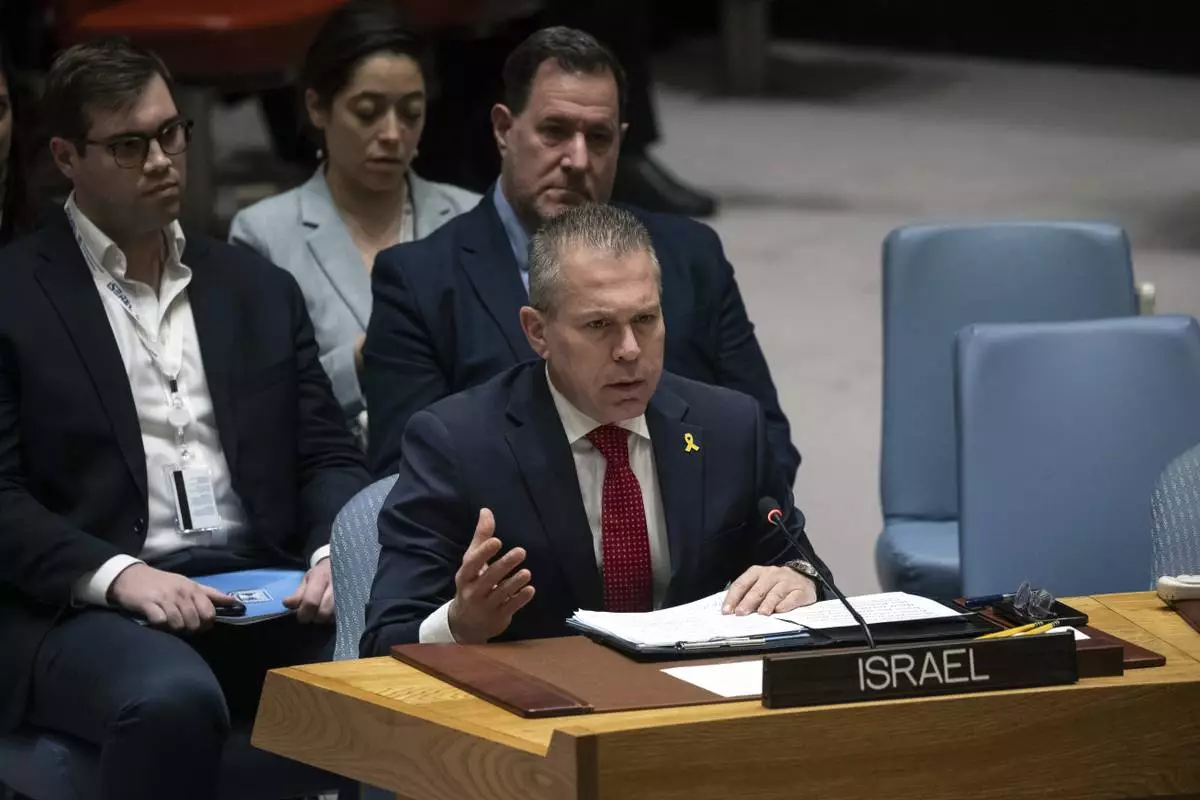
Israeli Ambassador to the United Nations Gilad Erdan speaks during a Security Council meeting at United Nations headquarters, Thursday, April 18, 2024. (AP Photo/Yuki Iwamura)
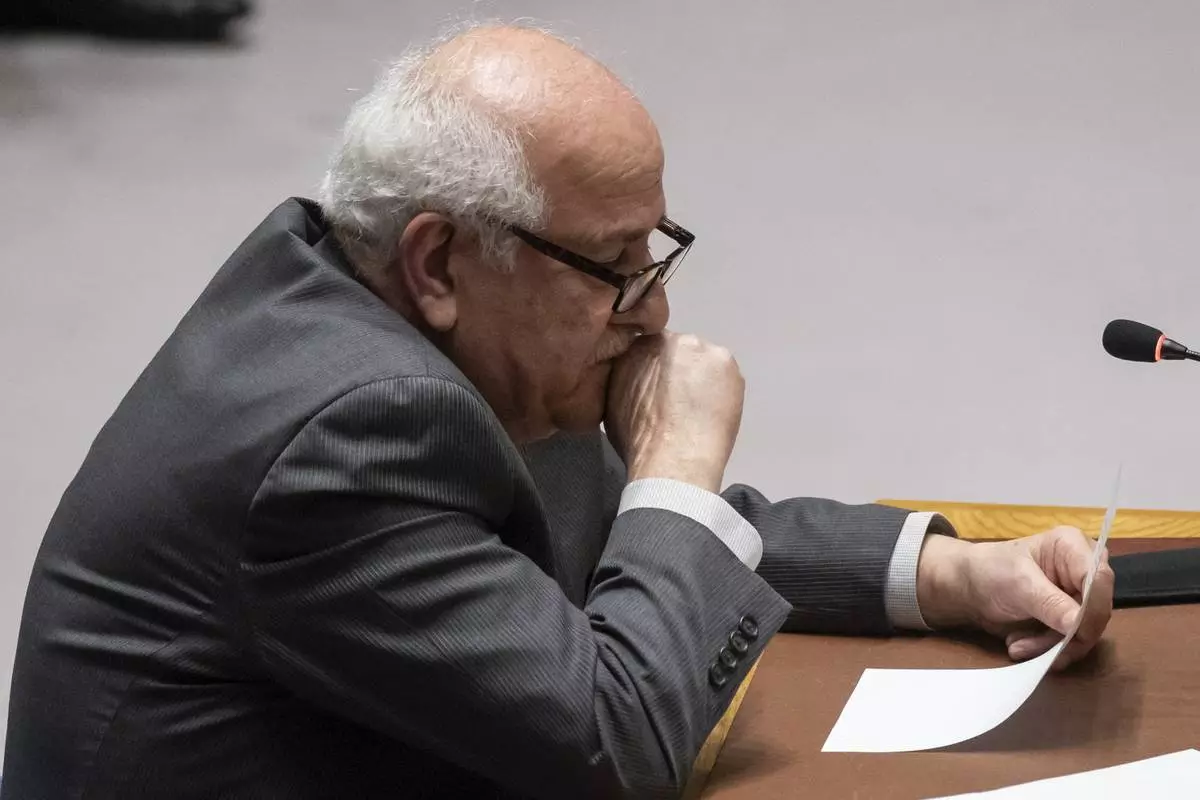
Palestinian Ambassador to the United Nations Riyad Mansour holds tears while speaking during a Security Council meeting at United Nations headquarters, Thursday, April 18, 2024. (AP Photo/Yuki Iwamura)
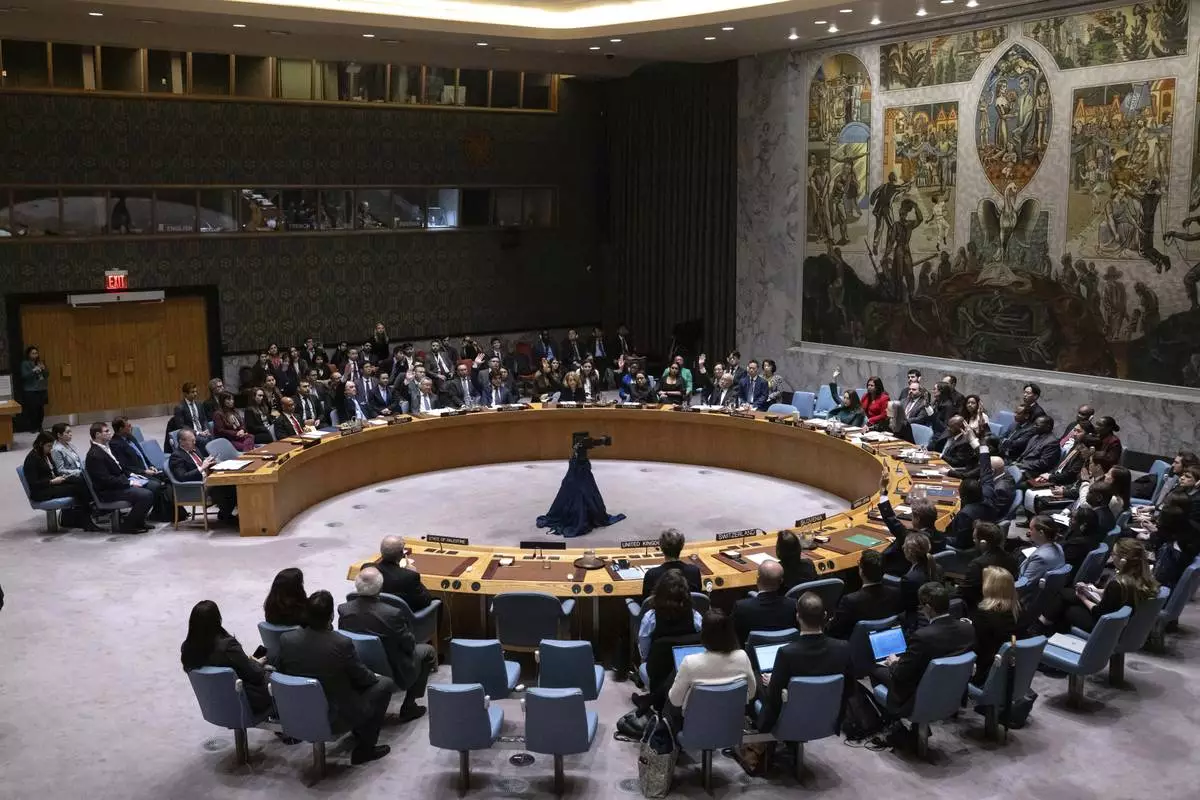
Representatives of member countries take votes during a Security Council meeting at United Nations headquarters, Thursday, April 18, 2024. (AP Photo/Yuki Iwamura)
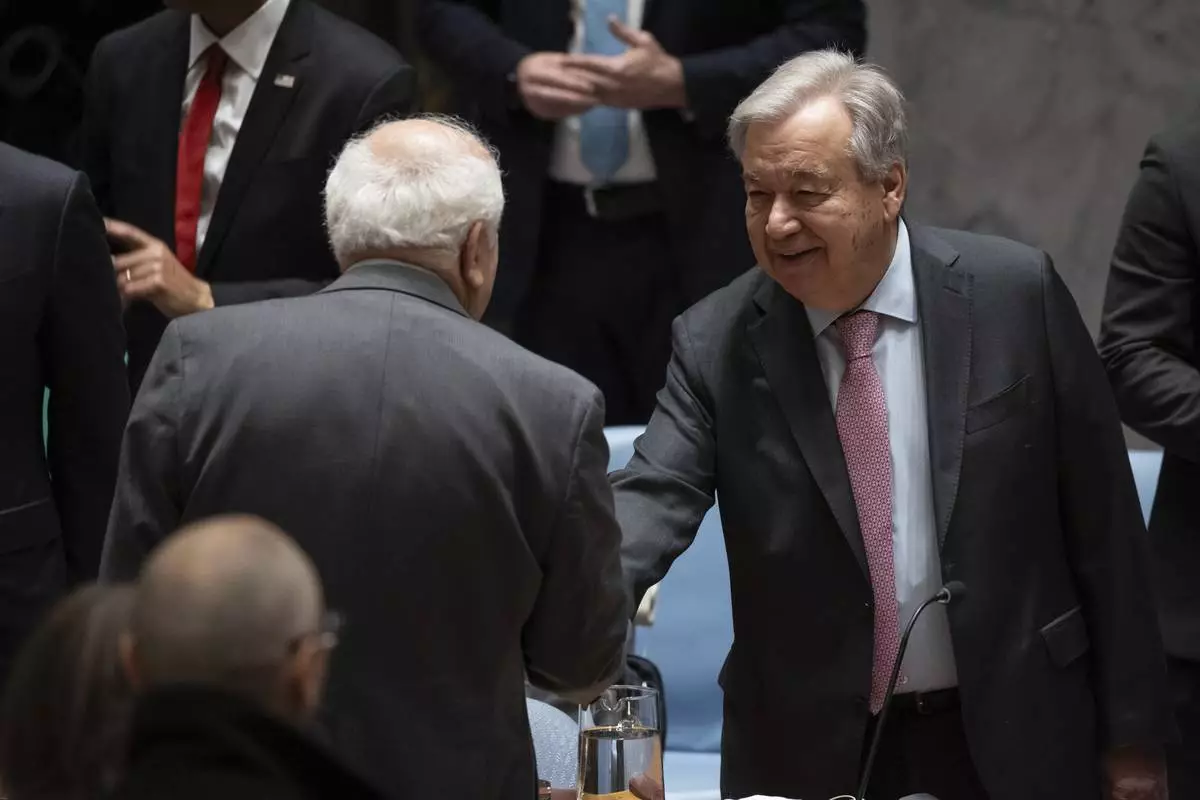
Palestinian Ambassador to the United Nations Riyad Mansour, left, and United Nations Secretary-General Antonio Guterres speak before a Security Council meeting at the United Nations headquarters, Thursday, April 18, 2024. (AP Photo/Yuki Iwamura)
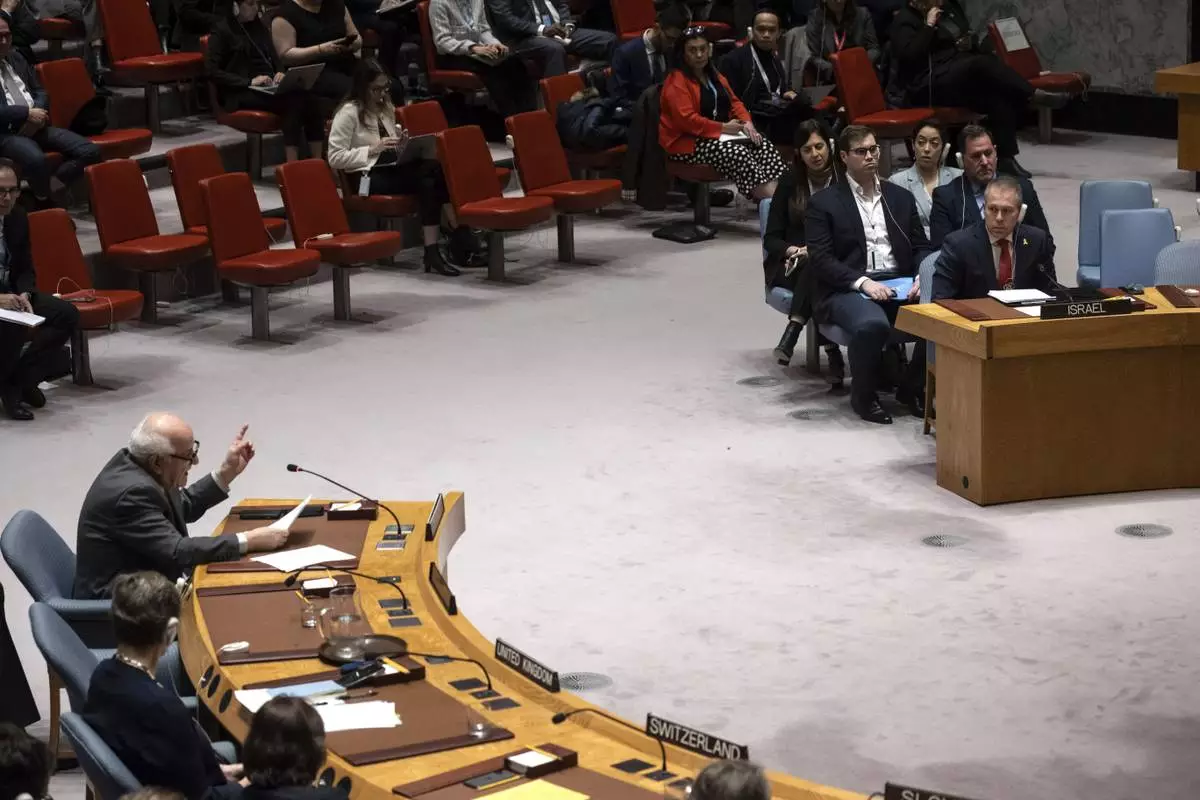
Palestinian Ambassador to the United Nations Riyad Mansour speaks during a Security Council meeting at United Nations headquarters, Thursday, April 18, 2024. (AP Photo/Yuki Iwamura)
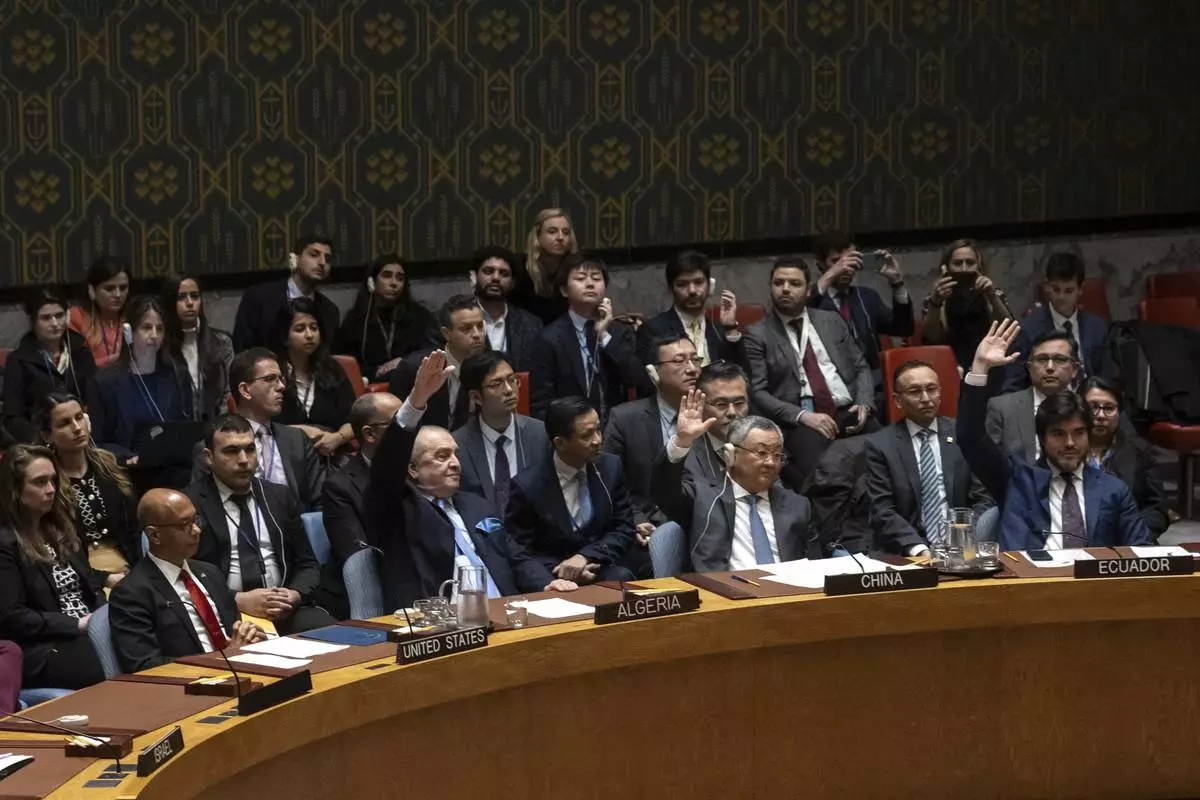
Representatives of member countries take votes during a Security Council meeting at United Nations headquarters, Thursday, April 18, 2024. (AP Photo/Yuki Iwamura)
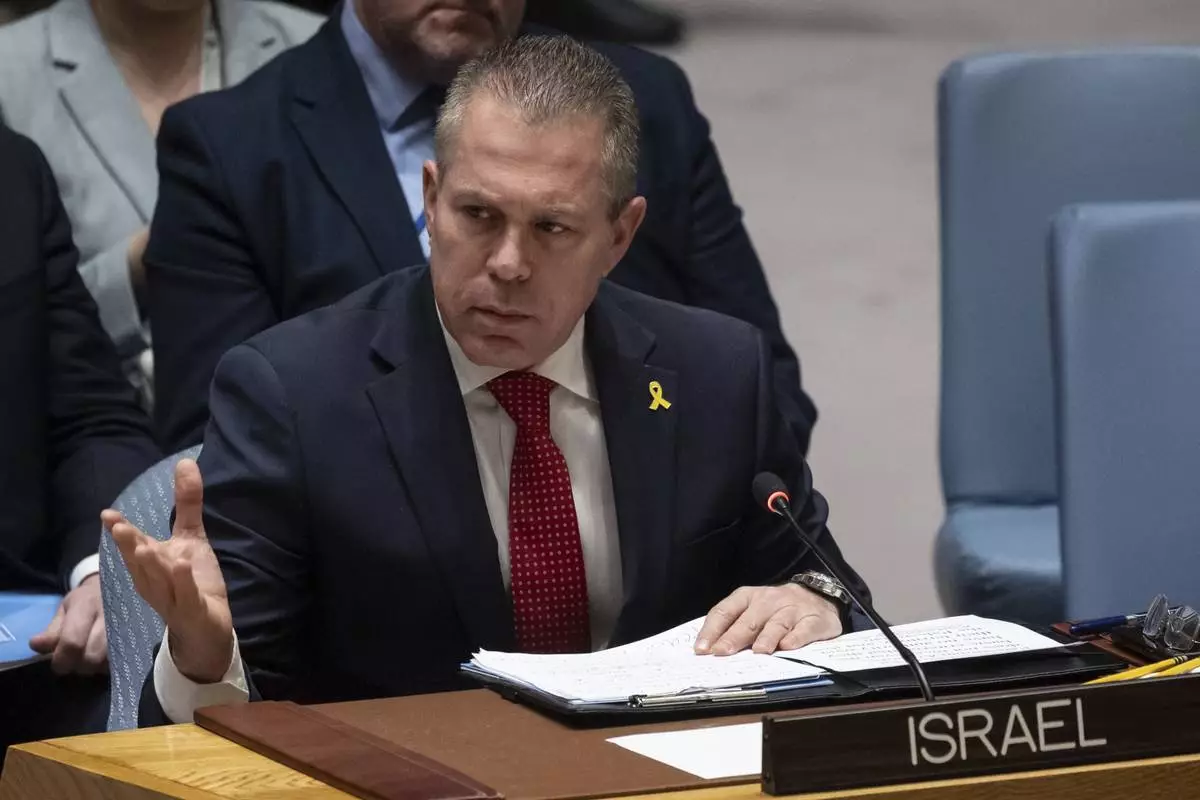
Israeli Ambassador to the United Nations Gilad Erdan speaks during a Security Council meeting at United Nations headquarters, Thursday, April 18, 2024. (AP Photo/Yuki Iwamura)
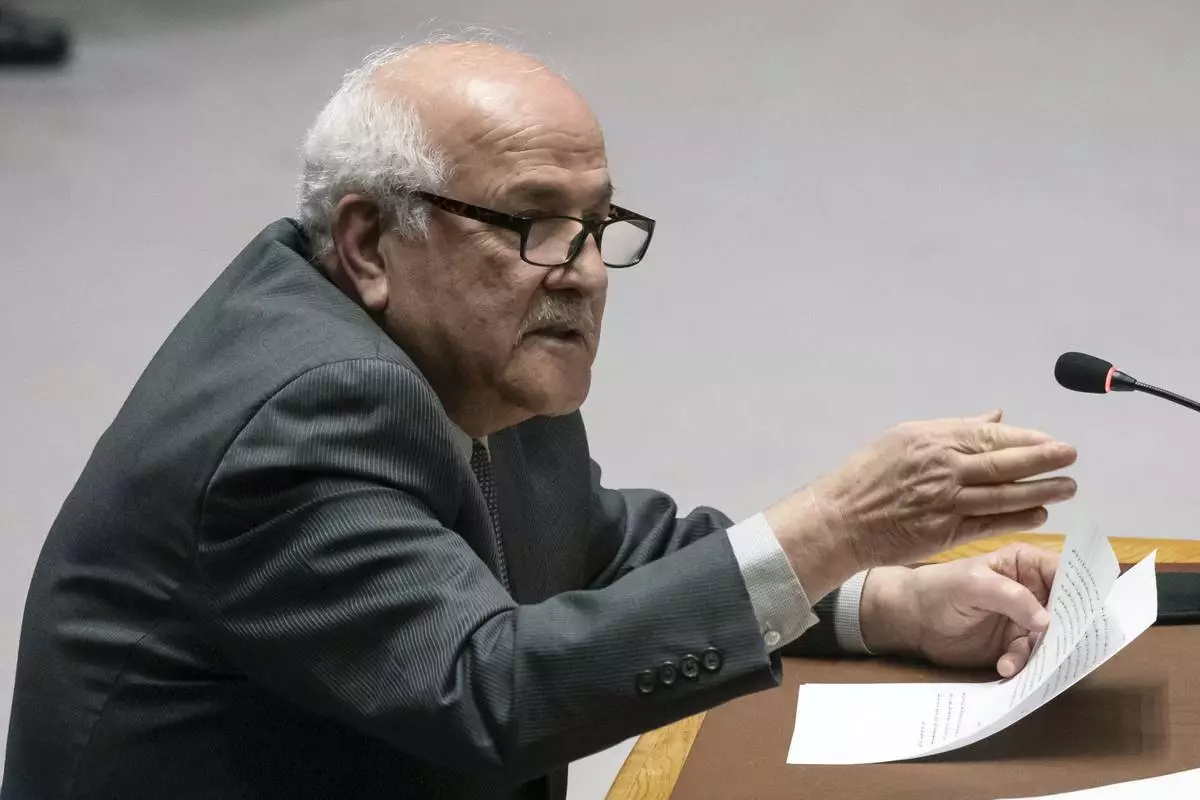
Palestinian Ambassador to the United Nations Riyad Mansour speaks during a Security Council meeting at United Nations headquarters, Thursday, April 18, 2024. (AP Photo/Yuki Iwamura)
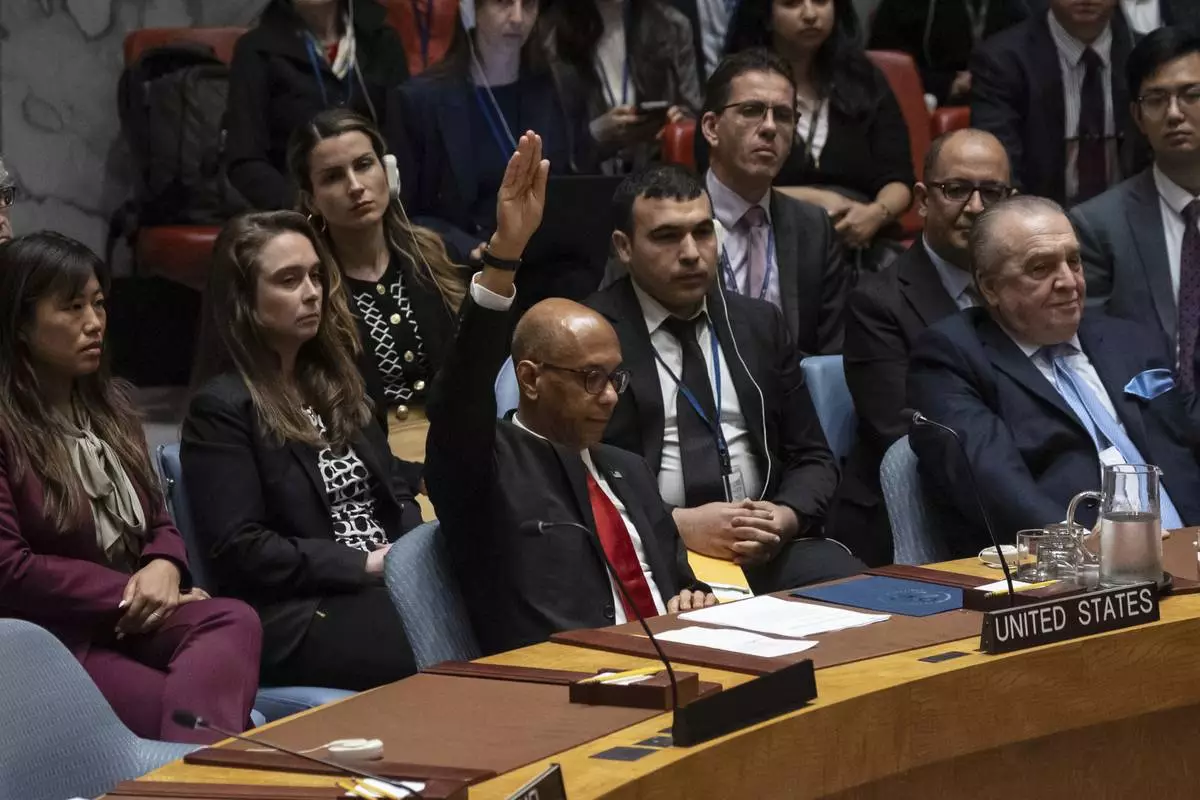
U.S. Deputy Ambassador Robert Wood votes against resolution during a Security Council meeting at United Nations headquarters, Thursday, April 18, 2024. (AP Photo/Yuki Iwamura)






















